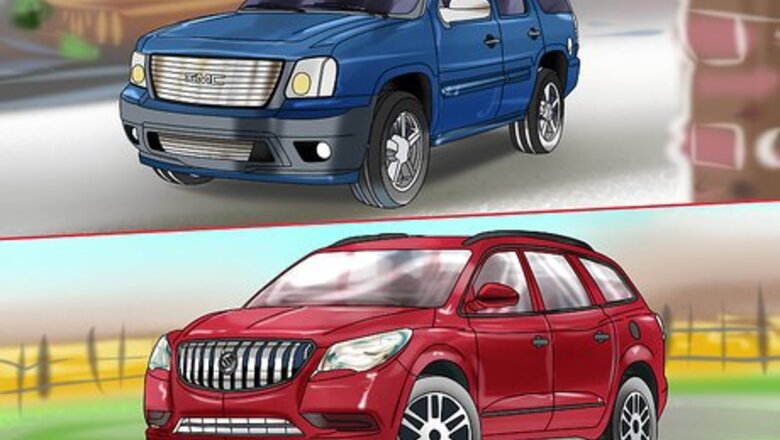
views
- Keep your car clean, especially the inside, so it feels comfortable. Invest in a cozy sleeping bag, a pillow, and earplugs to get a good night's sleep.
- Find a safe and inconspicuous place to park. Try big box retailers that are open 24 hours, low-traffic streets without sidewalks, or camp sites.
- Pick a few places to groom and shower regularly, like gyms, truck stops, or rec centers. Alternate so you aren't relying on one place.
At the Start
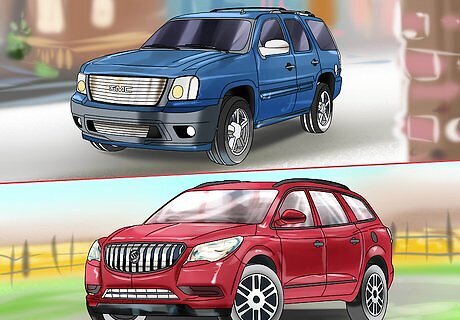
Find a suitable car. You can only live in your car successfully if your car works. If you have any lead time and see the writing on the wall ahead of time, get a van; ideally a windowless delivery van of some sort: you will have room under your platform bunk for storage, you can install a rooftop skylight/hatch for air, a rooftop rack for storage and even lookout when the skylight is open. An anonymous-looking white Chevy van or Holden panel van in Australia makes concealment a lot easier. You're going to need a new or "newish" car or be a good mechanic to live in an older car. If you have an old car keep in mind that you're liable to break down at an inopportune moment if you don't stay on top of maintenance.

Before you start living in your car, use your permanent address to: Rent a post office box or a Private Mailbox (PMB). Although PMBs tend to be more expensive, you can receive packages at them and some services will let you use an address format that makes it appear to be an apartment; this can be useful when someone requires a physical address. Sign up for a gym membership, or, if a gym is too expensive, a more affordable alternative is (depending on your location) to enroll at a local community college where you'll then be able to use their gym facilities. Renew any paperwork that will require an address to process soon. Put valuables in a safe deposit box at a bank. If you have friends or family who can't (or refuse to) help you with your living situation, or you refuse to ask them for help, think about at least asking them if you can use their address.
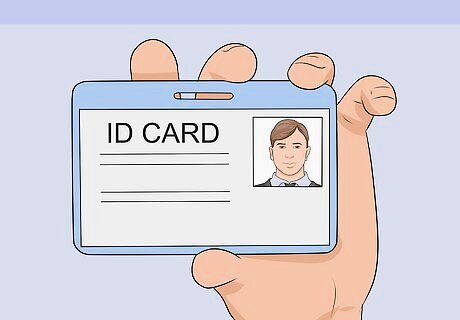
Keep your personal identification, driver's license, car insurance current at all times. Have it readily available for police inspection.
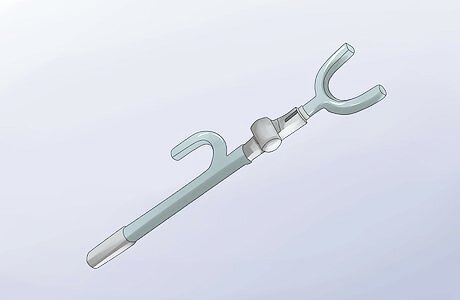
Buy a steering column lock and use it! Why so essential? Because if your vehicle gets stolen, your home is stolen, you may never see it again and then you really are in trouble! It's not just your property like it would be to someone with a home or an apartment - it's a matter of your survival. Buy one now! You can buy one for about $20.
Finding Safe and Inconspicuous Places to Park
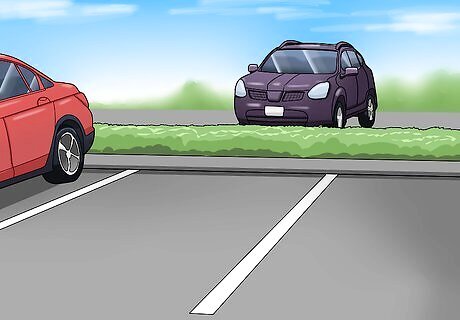
Find a safe and inconspicuous place to park. First, check with any friends or relatives to see if they will let you park on their property. If not, check to see if there are any organizations or businesses in your area (or a nearby area) that designates parking lots specifically for people in situations like yours; for example, Walmart allows people to camp overnight in their parking lots. It's not only legal, but the organization might screen the people who use the lot or even designate a women-only lot. If there are no such lots available, and you live in an urban area, look for streets with no sidewalks, no overlooking windows, and adjacent to woods; the area should be sparse enough to avoid nosy onlookers but populated enough that the car does not stand out. Parking lots of big-box retailers (especially those that are open 24 hours and have restrooms, such as Walmart) are great to clean up in and have security, as long as you spend a couple of dollars there and don't park in one place too often. Parking lots however can be noisy, particularly in the morning as trucks arrive carrying food and goods. Church car parks are often quiet during weekdays. If you check around, you may find a church that is less used than others. This could be a good place to park, and you may be able to ask for assistance at the church. You might even attend the church to gain rapport, but wait a while before telling others about your situation, and tell only those who seem trustworthy and willing to help. Industrial estates and business parks are often noisy by day, but very quiet at night. Small ones close to residential areas are best. They have to be quiet at night. You may encounter security in some places like this, but if you are honest, saying you are just sleeping the night in your car, they usually won't bother you. Their main role is to protect the property. University car parks. This is okay if you are a student, but not so good if you are not associated with the university. You may be required to get a parking permit. Camping grounds are another option, although they usually have time limits and some are almost as expensive as a hotel room. Some offer a shower for a nominal fee. National Forests have some free camping with a limit of 14 days. Yacht harbors are notoriously 'free zones'—given the nature of fishermen and boats, so marinas offer a lot of services, like hot showers and transient vehicles. If the season is high, larger boats from out of state show up and stay for months along with their respective crews, all of whom are 'transients' providing excellent cover for you and your vehicle. They don't know or care, and if they find out they still don't care, being a 'little wild' themselves. Hang around on the weekend and meet someone who wants their boat washed and waxed—that'll do it, from there on in you'll have a gate/shower key and legitimacy. If there's no restroom, having a creek nearby helps for rinsing purposes. Know how to safely defecate outdoors and make a poop tube. Five-gallon bucket with a lid and lye for odor can also work. A free hospital parking lot is another option. If approached by a guard, you can say that you're waiting to visit a sick relative. However, note that in Australia, due to past murders of nurses, you may attract police attention by parking in a hospital car park. You may be asked to move on by security. If you can establish rapport with the manager of a retail store or restaurant, they may not give you problems about staying overnight, especially if they see your presence as a form of overnight security. Try a hotel parking lot. Hotels and motels along the interstate allow cars to park until 11:00 a.m. the next day (checkout time). As long as your seat reclines fully, no one will notice you. However, you'll need to keep moving on. Once you find a spot, try to arrive late at night, and leave before 7 am. This will draw as little attention as possible to yourself.
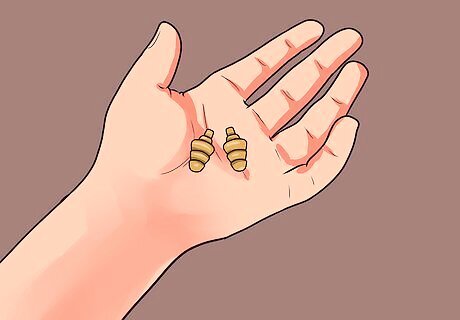
Get earplugs. Due to noise, you might find that you will need earplugs to sleep. Earplugs will block a lot of background noise to a level that is bearable. Earplugs are good for blocking out traffic, birds, animals, talking, and background music. They will not block out very loud noise or close noise, such as someone tapping on your car.
Finding the Essentials
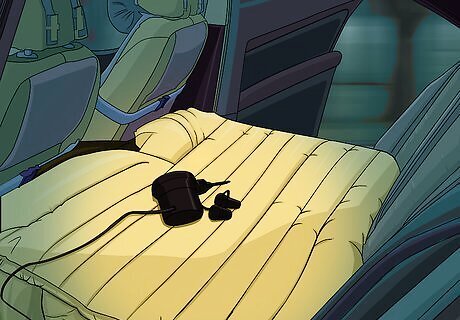
Get the things you'll need. The basic essentials for living in a car are a blanket, a pillow, and a mattress or some other padding. Due to the angles involved in the seating setup, you may develop dull back pain from the cramped quarters. Should this happen, be sure to have pain medication on hand. Once you have your sleeping gear, you'll want a blanket to place over the back seat, and draped over the two front seats. This will block light and people's views. A cheap cooler will help make life easier. The main thing the cooler needs is to be waterproof. Cold food will cause condensation, while ice will melt. You don't want that water inside of your car. A cooler will help keep your perishable food cool. It will work most efficiently when full, so add bottles of cold water to it as you take out food. If you choose to buy an electric cooler, it will need good ventilation to work. For this reason, it will not work well in your car's boot. It is best placed within the car when running. Make sure it is only running when the engine runs, or use a low voltage cut-out device, as explained below. Make sure the cooling vent grille is not touching anything as it exhausts waste heat and may set some things on fire. One essential item, if you can afford it is a Porta-Potty, a chemical toilet. These devices can really make living in a car bearable. They can be purchased for under $100 new these days. If you can't afford a Porta-Potty or don't have room for one, you can pee into wide-necked bottles like Gatorade bottles, or make an improvised bucket-style toilet.
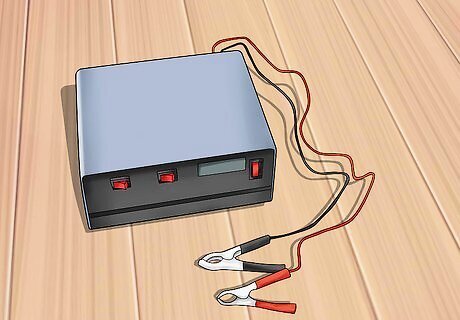
Buy a combo backup battery/air compressor to jump-start your car on your own. Have a spare tire and at least one can of tire sealant. Be sure the sealant is of the type that can be removed.
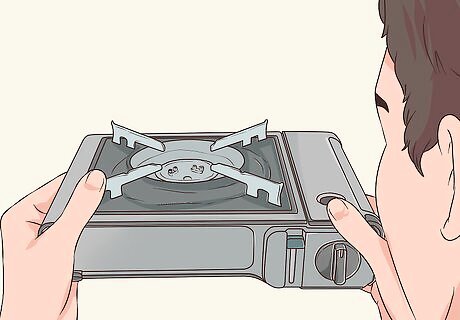
Find alternate ways of generating electricity. A cigarette lighter converter is one option. These are useful for powering low-consuming devices (100 watts), but if you plan on using your vehicle for cooking, then you'll need to draw power more directly from your battery or you'll blow the fuse. Running electric cooking appliances from your car though is fairly impractical without an expensive dual battery and inverter system. There are small 12-volt water heaters and skillets, but these generally are not very efficient. You will also need a much more expensive inverter if you plan to run things that use mains voltage. You may need to idle the vehicle while drawing this power if you don't have a dual battery system, however, even then, car alternators are not designed for such use and may not be able to produce the current you need. A good buy for any car dweller is a low voltage cut out device. This device protects your car's battery by cutting off the electricity once the battery reaches a voltage where it can still start the car, but can't really run plug-in devices much more. These usually retail for about $25-$40. They are a very good investment for a car dweller, as continual flattening of your battery will damage it, resulting in a costly replacement, and inconvenience of not being able to start the car. An alternative to electric cooking devices is to use gas for cooking, but do not use this inside the vehicle for safety reasons. There are many dangers associated with cooking inside your car: unstable surfaces, fire hazards, burns from hot metal or spilled liquids, carbon monoxide build-up, smells. Cooking is for outside of the car. If you live in a van with a stable set up for cooking, then cooking inside is okay, provided there is ventilation.
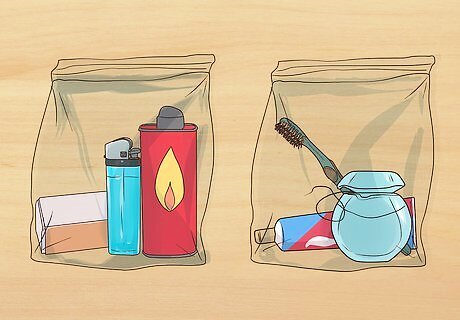
Have something portable to store your items. Get bags you can fill with your soaps, clothes, cell phone, etc. Keeping things in order will save you a lot of hassle. A vehicle may seem like a small space, but losing things can be extremely easy. Also, keeping things neat inside the car will draw less attention from people passing by who happen to look in the windows. Hiding your bedding might be a good idea (consider the trunk). If there is not room in the car for a week's worth of clothes and supplies, try to leave them at a friend's for safekeeping, and then you can have a reason to come over, and they may give you a shower and a place to hang out. When you do your laundry, be sure to get them bone dry, as you do not want damp clothes to mildew or smell bad in the car. When you're not in the car, leave windows cracked and dryer sheets scattered about to keep the interior smelling decent. Wash your sheets once a month, or else you risk smelling like a homeless person, which will blow your cover and get you treated like a homeless person.
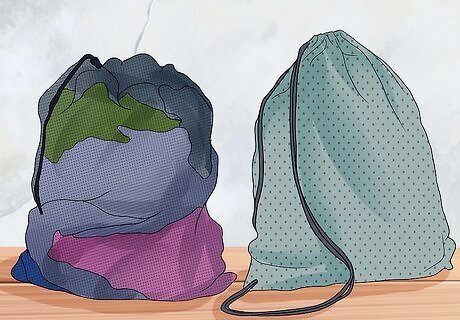
Keep dirty clothes separate in plastic bags so they do not smell up all your clothing.
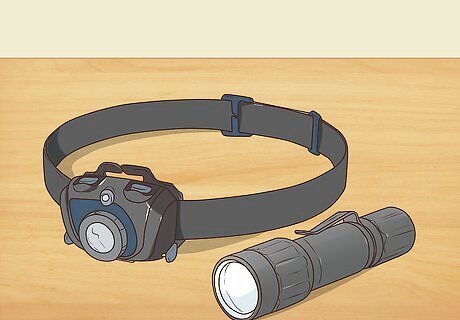
Get a good quality flashlight. A 3 or 4 battery Maglite flashlight serves two purposes: lighting and security. It is large enough to act as a metal baton to defend yourself, should the need arise.

















Comments
0 comment